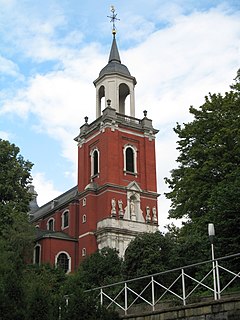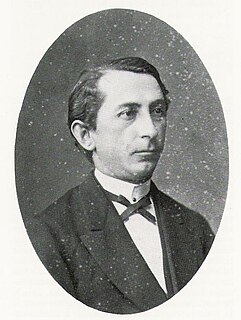
The First Vatican Council was convoked by Pope Pius IX on 29 June 1868, after a period of planning and preparation that began on 6 December 1864. This, the twentieth ecumenical council of the Catholic Church, held three centuries after the Council of Trent, opened on 8 December 1869 and adjourned on 20 October 1870. Unlike the five earlier general councils held in Rome, which met in the Lateran Basilica and are known as Lateran councils, it met in the Vatican Basilica, hence its name. Its best-known decision is its definition of papal infallibility.

Johann Joseph Ignaz von Döllinger, also Doellinger in English, was a German theologian, Catholic priest and church historian who rejected the dogma of papal infallibility. His criticism of the papacy antagonized ultramontanes; but his reverence for tradition annoyed the liberals.
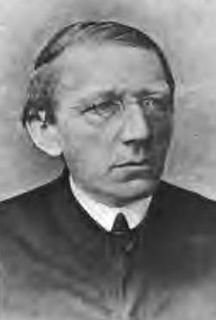
Franz Heinrich Reusch was an Old Catholic theologian.
Joseph Langen was a German theologian and priest, who was instrumental for the German Old Catholic movement.

Karl Josef von Hefele was a Roman Catholic bishop and theologian of Germany.

Johann Heinrich Christoph Willibald Beyschlag was a German theologian from Frankfurt am Main.
The Catholic Diocese of the Old Catholics in Germany is the German member body of the Union of Utrecht of Old Catholic Churches, which follow Ultrajectine theology. It is permitted to levy the German church tax on its members. Its episcopal see is in Bonn, as is its theological faculty. Its membership is concentrated around Cologne, Bonn, the Ruhr and southern Baden. The bishop of the diocese is Matthias Ring.
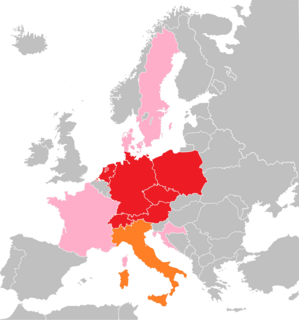
The Union of Utrecht of the Old Catholic Churches (UU) is a federation of Old Catholic churches, nationally organised from 1870 schisms which rejected Roman Catholic doctrines of the First Vatican Council; its member churches are not in communion with the Roman Catholic Church. The 1889 Declaration of Utrecht is one of three founding documents together called the Convention of Utrecht. The UU is in full communion with the Anglican Communion through the 1931 Bonn Agreement; and, with the Philippine Independent Church, the Spanish Reformed Episcopal Church, and the Lusitanian Catholic Apostolic Evangelical Church through a 1965 extension of the Bonn Agreement. As of 2016, the UU includes six member churches: the Old Catholic Church of the Netherlands (OKKN), the Catholic Diocese of the Old Catholics in Germany, the Christian Catholic Church of Switzerland, the Old Catholic Church of Austria, the Old Catholic Church of the Czech Republic, and the Polish Catholic Church in Poland.
Anton Günther was an Austrian Roman Catholic philosopher whose work was condemned by the church as heretical tritheism. His work has been described as Liberal Catholicism and Vienna's first Catholic political movement.
The historic or historical episcopate comprises all episcopates, that is, it is the collective body of all the bishops of a church who are in valid apostolic succession. This succession is transmitted from each bishop to their successors by the rite of Holy Orders. It is sometimes subject of episcopal genealogy.

In the Catholic Church, a dogma is a definitive article of faith (de fide) that has been solemnly promulgated by the college of bishops along with the Pope at an ecumenical council or by the pope alone, when speaking in a statement ex cathedra, in which the magisterium of the Church presents a particular doctrine as necessary for the belief of all Catholic faithful. For example, Christian dogma states that the resurrection of Jesus Christ is the basic truth from which salvation and life is derived for Christians. Dogmas regulate the language, how the truth of the resurrection is to be believed and communicated. One dogma is only a small part of the Christian faith, from which it derives its meaning. A dogma of the Catholic Church is defined as "a truth revealed by God, which the magisterium of the Church declared as binding." The Catechism of the Catholic Church states:
The Church's Magisterium asserts that it exercises the authority it holds from Christ to the fullest extent when it defines dogmas, that is, when it proposes, in a form obliging Catholics to an irrevocable adherence of faith, truths contained in divine Revelation or also when it proposes, in a definitive way, truths having a necessary connection with these.
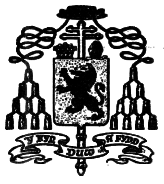
Arnold Harris Mathew, self-styled de jure 4th Earl Landaff of Thomastown, was the founder and first bishop of the Old Catholic Church in the United Kingdom and a noted author on ecclesiastical subjects.
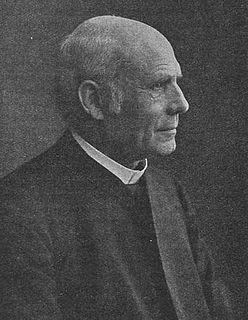
Theodor Hubert Weber was a German theologian and professor of philosophy.

Gerardus Gul (1847-1920) served as the seventeenth Archbishop of Utrecht from 1892 to 1920. He is known for his role in assisting the persons who would later found the Polish National Catholic Church in the United States, as well as for consecrating Arnold Harris Mathew, the founder and first bishop of the Old Catholic Church in Great Britain.

The following outline is provided as an overview of and topical guide to the Catholic Church:
Henricus Loos served as the fifteenth Archbishop of Utrecht from 1858 to 1873. Together with Bishop Hermann Heykamp of Deventer, Loos is known as one of only two bishops whose orders were recognized by the Roman Catholic Church, but who were not invited to the First Vatican Council. Loos served as Archbishop of Utrecht during the first two Old Catholic Congresses in Munich in 1871 and in Cologne in 1872.
Johannes Heykamp served as the sixteenth Archbishop of Utrecht from 1875 to 1892. A learned theologian, Heykamp is most remembered for summoning the conference that led to the Declaration of Utrecht.
The public domain consists of all the creative works to which no exclusive intellectual property rights apply. Those rights may have expired, been forfeited, expressly waived, or may be inapplicable.

The Encyclopædia Britannica, Eleventh Edition (1910–11) is a 29-volume reference work, an edition of the Encyclopædia Britannica. It was developed during the encyclopaedia's transition from a British to an American publication. Some of its articles were written by the best-known scholars of the time. This edition of the encyclopedia, containing 40,000 entries, is now in the public domain, and many of its articles have been used as a basis for articles in Wikipedia. However, the outdated nature of some of its content makes its use as a source for modern scholarship problematic. Some articles have special value and interest to modern scholars as cultural artifacts of the 19th and early 20th centuries.



